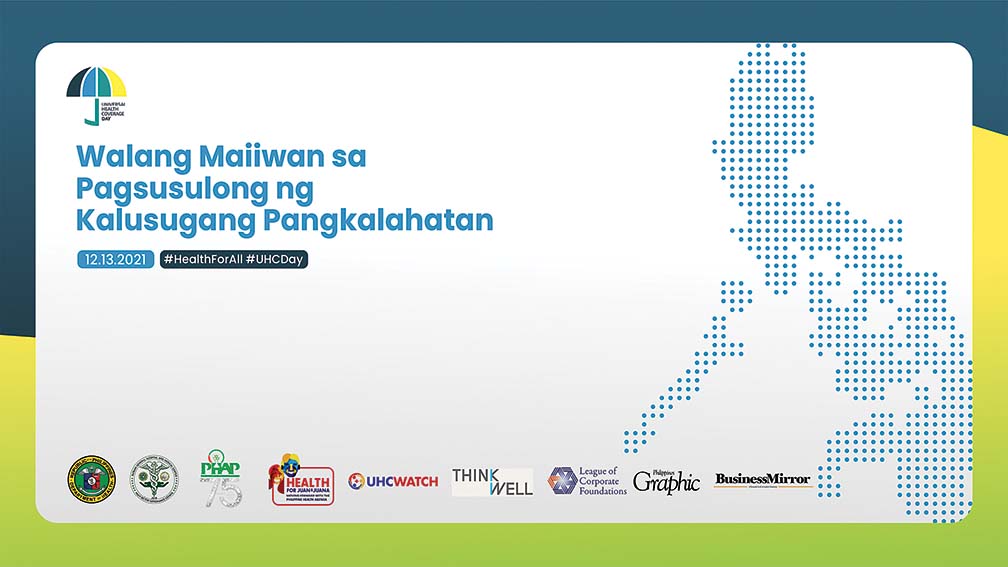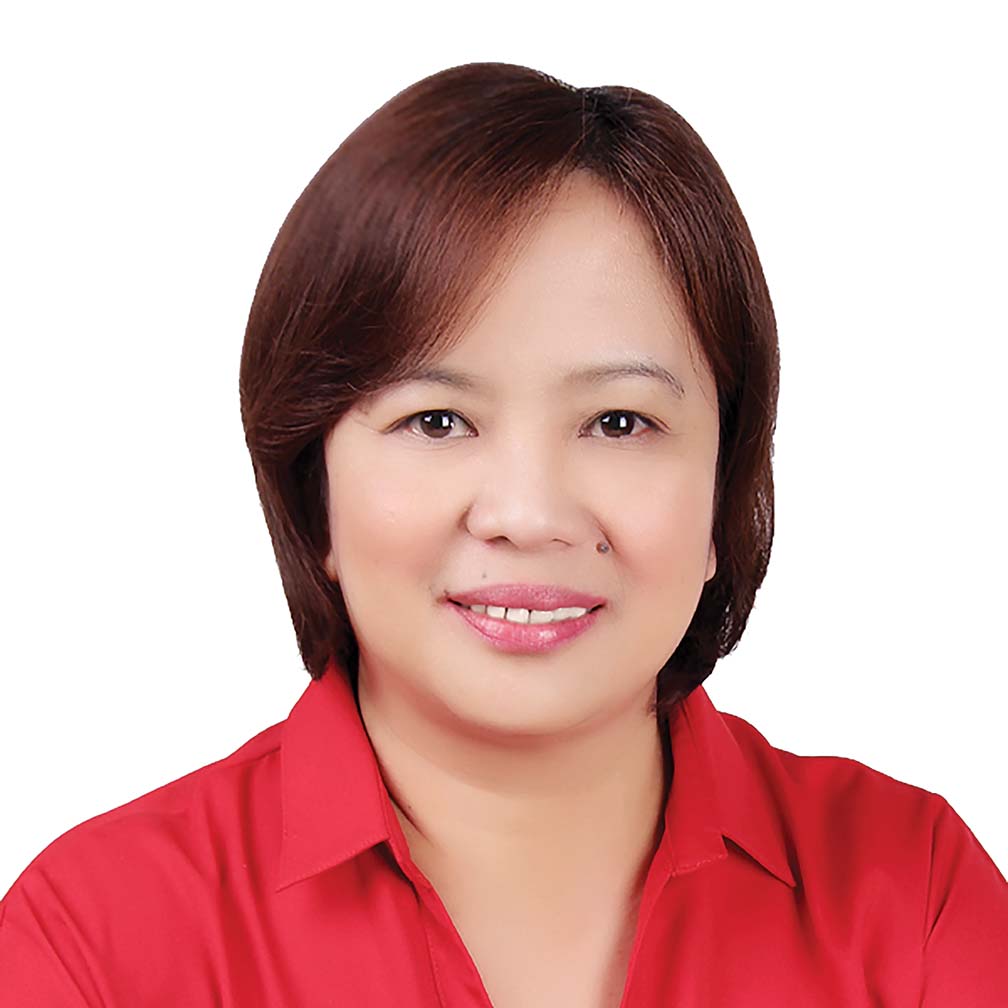Leave no one behind, make universal health coverage a reality, according to World Health Organization Regional Director for Southeast Asia Dr. Poonam Khetrapal Singh. He said that “UHC means that all people, however rich or poor and wherever they live, are able to access the healthcare they need without incurring financial hardship. We must make UHC a reality and ensure no one is left behind.”
When you think of “Walang Maiiwan” (No one will be left behind), there are three questions that come to mind:
1. HOW DO WE ENSURE THAT NO ONE WILL BE LEFT BEHIND?
2. WHAT IS THE IMPORTANCE OF INVOLVING EVERY ONE?
3. WHAT IS OUR ROLE OR HOW CAN WE CONTRIBUTE TOWARDS THE ACHIEVEMENT OF UNIVERSAL HEALTH CARE (UHC)?
HOW CAN WE ENSURE THAT NO ONE WILL BE LEFT BEHIND?

UHC means that all people will be given the quality services without the financial hardship experienced when people become ill. We have to ensure that there is an equitable health system which is embodied in Republic Act 11223 to achieve universal health coverage for all Filipinos.
Dr. Singh mentioned four ways on how we can increase coverage and progress in our journey towards UHC.
First, access to quality frontline healthcare is essential. Quality frontline services enhance equity. Most of the time, people tend to be choosy when going to a hospital. They think the doctors in a hospital or a barangay health center don’t know anything. We must ensure that the frontline or even barangay health stations must have quality services. Some patients go to private hospitals because they believe it’s better there, where the staff is knowledgeable, the place is clean. One thing critical is to ensure that there is access to quality frontline healthcare services.
Second, a well-trained, highly motivated workforce must be created. We cannot deny the commitment and the dedication of our workforce. Remember that during the early part of the pandemic in 2020, the healthcare workforce was stigmatized, they experienced discrimination, and there were even times that they experienced physical abuse, that instead of raising their morale for doing their duties right and efficient, they are persecuted. They should be given due respect for all their hard work, and they should be given gratitude to keep them motivated and be given due benefits so they don’t have to leave and our healthcare system will further improve.
Third, we must reduce out-of-pocket payments. We incurred a lot of expenses during this COVID-19 pandemic, such as during the surge of COVID cases. Being hospitalized for severe cases incurred tremendous expenses, which is a big burden to families. For those who are poor, it means they will have no access to healthcare services and will be left behind.
And the fourth thing is to monitor who are not getting access to care and who is getting poor as a result of health care. If the patient will be forced to sell properties or assets just to meet healthcare needs, let’s say the patient has cancer or is undergoing dialysis, don’t expect that they will return to health facilities to avail of the services. So we must monitor these types of patients so that they can be provided with the healthcare services that is due them.
WHAT IS THE IMPORTANCE OF INVOLVING EVERYONE?
UHC ensures that all people everywhere can get quality services, meaning everyone is involved. It is said that health policies and programs must engage communities on the ground in order to leave no one behind in the progress toward UHC.
These communities are the underprivileged, underserved especially those who do not believe in the healthcare system. They must believe that the system can be trusted, to a point that they will access the services.
It said that social participation works. Engaging those left behind helps to drive UHC. This means that we should involve civil society, the private sector so that everyone will participate.
One critical lesson from the COVID-19 pandemic is that transparent and inclusive decision-making needs to be prioritized in the health arena in order to create resilient health systems and drive progress towards UHC.
The pandemic noted that as health decision making takes up more space in the public domain, there is a momentum to push for further transparency and participation. Of course, people will disagree with government’s actions, but this doesn’t mean our programs are ineffective.
HOW CAN WE CONTRIBUTE TOWARDS THE ACHIEVEMENT OF UNIVERSAL HEALTH CARE (UHC)?
Our earlier speaker said all throughout the pandemic, the health sector was here. They never left. It is already part of our lives that in this war, the health sector, the DOH has to take a stand to lead.
To ensure that we will be able to push for the establishment of UHC—leaving no one behind and investing in health systems for all—the national government and the local government as exemplified by the good Governor of Bataan will help to take the lead to ensure universal health coverage. But if the government alone will act on it, we will not have any success.
Now, looking back at 2019, I would like to congratulate the province of Bataan. You were the first province in Region 3 to signify that you want to be a pilot site for Universal Health Care (UHC).
There are three other UHC implementation sites in the region. These are Pampanga, Bulacan and Tarlac. And I’d like to inform everyone that Bataan is one of the first to achieve a lot of their UHC implementation deliverables.
Moving this vision of UHC coverage to implementation will only be possible if we have cooperation, partnership, and knowledge sharing like what is being done now with the private sector—business, civil society and the academe. And this is what I saw during this webinar today. All sectors are represented in thiswebinar this afternoon.
6 BUILDING BLOCKS
I would also like to put emphasis on the six Building Blocks that must be in place, where each one plays an important part:
1) Leadership and Governance, where effective leadership and governance ensures the existence of good policy frameworks, effective oversight and coalition-building, provision of appropriate incentives and attention to system design and accountability;
2) A good financing system to help raise adequate funds for health;
3) A well-performing health workforce to ensure efficiency;
4) A Health Information System to ensure production and analysis dissemination of reliable information;
5) The procurement and supply programs of medical products and technologies; and
6) Good Service Delivery, which is comprised of quality access, safety, and coverage.
The COVID-19 pandemic exposed the fragmentation of our health system and made the implementation of the UHC Act more urgent.
We are guided to enjoin all stakeholders in a whole-of-government and whole-of-society approach as it endeavors all resources toward achieving a healthcare system that can respond to the needs of the people as we continue to push forward to ensure UHC.


